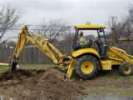
One-Call Systems Still Needed for Safe Excavations
Last week's 2009 Underground Construction Technology International Conference & Exhibition in San Antonio brought contractors, vendors, and safety personnel together for the latest information about underground utility work – trenchless and excavations alike. The 2010 UCT event is set for Tampa, Fla. A new reminder about unsafe excavations by Britain's Health and Safety Executive illustrates the hazards and proves this is an international problem.
HSE, the British OSHA agency, prosecuted a company named Trains (Rochdale) Limited after a worker received burns on his left hand and arm because he struck a live electrical cable while using a mechanical breaker to break up a concrete slab. The incident happened Aug. 8, 2007, as the man was preparing to install a fence around a parking lot at a site owned by the company, which was fined about $1,400 and ordered to pay court costs of about $2,800 after being found guilty of violating section 4(3) of the Electricity at Work Regulations 1989, HSE announced Jan. 27. HSE said the company did not give the work crew plans of the underground utilities at the site and did not do a survey to locate the utility lines.
"If the company had simply provided the plans, undertaken the scans, and located the cable, digging in the area could have been avoided and this incident would never have occurred," said Rosemary Leese-Weller, HSE's investigating inspector. "This incident was easily avoidable."
There are national and state programs in the United States to encourage excavators and homeowners to call before digging to ensure underground utilities aren't damaged. The Common Ground Alliance is behind the Call 811 campaign, and the Texas Excavation Safety System is an example of a state program. TESS operates GeoCall, a one-call system integrated with GIS, and hosts training throughout Texas for excavators and emergency responders.